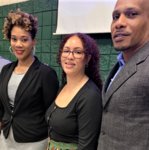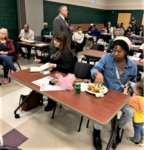



(Editor's note: This column has been updated to correct the spelling of the names of Cynthia Leeks and Lisette Rodriguez as well as the proportion of city funding that goes to the Fayetteville Police Department.)
You might say Sheila Cuffee and Cynthia Leeks just simply cut to the chase.
They were among about 60 people who came Monday to Arthur D. Smith Recreation Center to hear from Lisette Rodriguez, Shaun McMillan and Latisha McNeill about how an “office of community safety” can make a difference in the lives of those suffering a mental health crisis when Fayetteville police are called to investigate a 911 call and potential crime.
A case in point is the shooting death of 22-year-old Jada Johnson, who died July 1, 2022, at the hands of a city police officer at her grandfather’s Briarwood Hills home. The woman, according to McMillan of Fayetteville Freedom for All, was shot 17 times by that officer.
“She was sleep-deprived and spent a week in the hospital before her death,” McMillan told those attending the town-hall meeting Monday night. “She was shot 17 times — twice in the head.”
McMillan left out other details about Johnson’s death, including how police officers attempted to de-escalate that July 1 late-night evening; that the young woman was wielding a handgun; that her 21/2-year-old daughter was in the home along with grandparents Rick and Marie Iwanski; and that police officers, according to published reports, feared for their own safety and the safety of those in the home.
Something you cannot argue, however, is that 17 shots does seem excessive, including, according to published autopsy reports, shots to the young woman’s torso, hip and shoulder.
Two officers involved in the shooting were placed on paid administrative leave, according to reports, and the case was turned over to the State Bureau of Investigation. The case, according to published reports, has been sent to the Special Prosecution Division of the North Carolina Attorney General’s Office.
A Crisis Intervention Team of licensed mental health practitioners, the woman’s grandfather, Rick Iwanski, said Monday, perhaps could have saved his granddaughter’s life on July 1 at the home along Colgate Drive.
“You have been given a lot of great information here tonight,” said Latisha McNeill, director of the Office of Community Safety in Greensboro that was begun in 2020. “We realized we needed to do things different for our city. Most of our responders are licensed clinicians, and all the (police) officers are CIT-trained.”
Police officers will secure a 911 call at a scene where a mental health issue is evident, McNeill said, and then they will turn over the matter to CIT unless the team requests a police presence.
A grandfather’s words
Similar programs have been established, Rodriguez said, and have proven successful in Durham with its HEARTS (Holistic Empathetic Assistance Response Teams); CAHOOTS (Crisis Assistance Helping Out On The Streets” in Eugene and Springfield, Oregon; and STAR (Support Team Assisted Response) in Denver, Colorado.
The program can save cities money, the 25-year-old Rodriguez said, and the programs can make a difference in saving lives as police so often are faced with mental health issues when a 911 call comes.
“The OCS is the way to go,” freshman Fayetteville City Councilman Mario Benavente told the audience.
Other council members present were Mayor Mitch Colvin, D.J. Haire, Shakeyla Ingram, Courtney Banks-McLaughlin, Brenda McNair, Kathy Keefe Jensen and Derrick Thompson.
An OCS program comes with a price tag of $1 million to $2.5 million, Rodriguez said, or 1% of the city budget. and it would be paid for by the city. She said $60 million of the city’s $250 million budget is earmarked for the Police Department.
Rodriguez, McMillan and other supporters of an OCS for the city, which includes public oversight of the Police Department, say they are not going away and they’ll keep pounding the drum at City Council public forum meetings. They even hope to place it on the ballot in a referendum in the November election.
“Mental health has come on strong since COVID,” Rick Iwanski said. “The mental health issue is a big problem. Children are getting affected with mental health, particularly the teens.”
Epilogue
As the town-hall meeting neared an end, Sheila Cuffee and Cynthia Leaks had heard all they needed to hear.
“I love Fayetteville,” Cuffee said. “I’m upset about Jada Johnson. I hope the City Council will say this is a good thing. I think we have to start bombarding our city manager” and the City Council to bring an OCS program to this city. “We need boots on the ground. Let’s stop talking” and get this done.
Leeks was with Cuffee about an OCS.
“I’m a homegirl,” Leeks said. “I love Fayetteville. I was raised on Murchison Road. A lot has happened on the corridor, but this is great. We need to put pen to paper and get moving.”
This city hasn’t heard the last from Lisette Rodriguez or Shaun McMillan or Councilman Benavente on an office of community safety, and neither has the City Council or the city manager or the city police chief.
And that’s just how it is.
Bill Kirby Jr. can be reached at billkirby49@gmail.com or 910-624-1961.